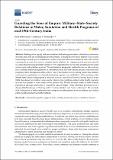Guarding the sons of empire: military-state-society relations in water, sanitation and health programs of mid-19th-Century India
Author(s)
Halvorson, Sarah J.; Wescoat, James
Downloadwater-12-00429-v2.pdf (852.7Kb)
Publisher with Creative Commons License
Publisher with Creative Commons License
Creative Commons Attribution
Terms of use
Metadata
Show full item recordAbstract
Drinking water supply and sanitation have had a strong association with military institutions in South Asia from the colonial period to the present. This paper shows how military-state-society relationships created spaces of differential water access and sanitation burdens in mid-19th-century cantonments in ways that involved complex gender relations. In comparison with previous research, we argue that privileged military enclaves were segregated but never fully separated from larger urban water and sanitation systems. We use historical geographic methods to review the evolving role of military sanitation regulations in cantonments from late-18th-century policies of the East India Company (EIC) through mid-19th-century rule by the British Crown, during which time military cantonments, regulations, and formal monitoring reports were established. Close reading of the British Army Medical Department’s Statistical, Sanitary, and Medical Reports (Sanitary Reports) in the 1860s then shows how military-state-society relations diverged from civilian public health programs in ways that persist to some extent to the present day. Health advisors, some of them women, pursued an ideology and tactics to “guard the sons of empire”, from what they perceived to be a disease-filled landscape of “lurking evils”, “choleric attacks”, and “native offensives”. We conclude with a discussion of both continuities and change in the relationships between military and civilian public health reforms beyond the barracks. Keywords: cantonments; gender; hygiene; India; military sanitation; water; waterborne disease
Date issued
2020-02-05Department
Massachusetts Institute of Technology. School of Architecture and PlanningJournal
Water
Publisher
Multidisciplinary Digital Publishing Institute
Citation
Halvorson, Sarah J., and James L. Wescoat Jr., "Guarding the sons of empire: military-state-society relations in water, sanitation and health programs of mid-19th-Century India." Water 12, 2 (2020): no. 429 doi 10.3390/w12020429 ©2020 Author(s)
Version: Final published version
ISSN
2073-4441